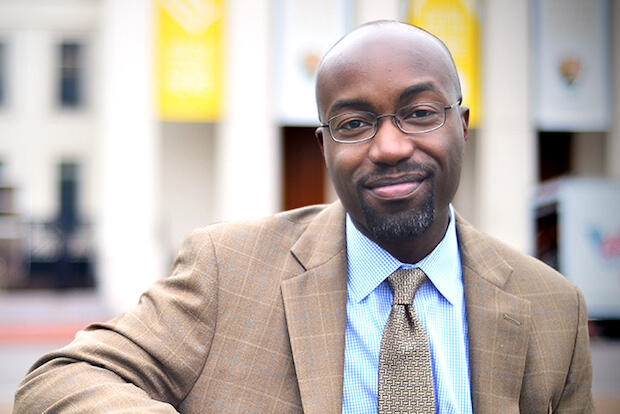
March 28, 2019
Health equity expert to speak about efforts to close racial health gaps
Jason Purnell hopes his April 4 talk in Richmond will spark more community engagement in health sciences research.
Share this story
A few months before unarmed black teen Michael Brown Jr. was shot to death by a white police officer in the suburban St. Louis town of Ferguson, Jason Purnell, Ph.D., an associate professor at Washington University in St. Louis, published a report on health disparities that found, among other things, that blacks in St. Louis were 17 times more likely to be injured by firearms than their white neighbors.
Purnell’s report, “For the Sake of All: A Report on the Health and Well-Being of African Americans in St. Louis — And Why it Matters for Everyone,” chronicles St. Louis’ persistent racial gaps in education, employment, poverty and mortality. It revealed striking inequalities in St. Louis County, such as the 18-year gap in life expectancy at birth between the predominantly black, low-income neighborhood of Jeff-Vander-Lou and the largely white, affluent suburb of Clayton.
Similar inequalities exist in Richmond. A report published by the Virginia Commonwealth University Center on Society and Health found a 20-year life expectancy gap between the predominantly black Gilpin Court neighborhood and Westover Hills, an affluent mostly white community 5 miles to the west.
“St. Louis and Richmond share some difficult history around issues of race, equity and inclusion,” said Purnell, who will speak in Richmond on April 4 as part of VCU's participation in National Public Health Week. “Our efforts as a region to address some of these challenges, particularly following the shooting death of Michael Brown, may be instructive for Richmond’s own agenda.”
Purnell will present a talk titled “Advancing Health Equity in St. Louis and Beyond,” at One Capitol Square, 830 E. Main St., from noon to 1 p.m. During his presentation, he will discuss Health Equity Works, a research-based initiative housed in the Brown School of Washington University in St. Louis that specializes in bringing quality, accessible research on health disparities into communities. The organization connects communities with data and provides people with resources, tools and solutions to accelerate action on the many social conditions that influence health and well-being.
Health Equity Works started as a result of Purnell’s report and evolved to include community engagement to address the report’s recommendations.
“Health Equity Works translates data into action to advance community health,” Purnell said. “We partner with a diverse set of community stakeholders to conduct and present research in accessible ways that can inform practice and policy.”
At his April 4 presentation, Purnell hopes to inspire students and faculty members to collaborate with community members on research plans.
“Clinical and translational scientists who want their research to be better connected to the community will need to leave their offices in order to do so,” he said. “Often, this requires showing up and becoming a ‘known quantity’ in the community, offering to help solve problems that may not be connected to one’s current research project. Building upon a foundation of trust will help to identify areas where community needs intersect with scientific inquiry.”
VCU’s participation in National Public Health Week is co-sponsored by the C. Kenneth and Dianne Wright Center for Clinical and Translational Research, the VCU Division of Epidemiology at VCU School of Medicine’s Department of Family Medicine and Population Health and the VCU Center on Society and Health. The week includes presentations by Virginia Department of Health leadership and United Network for Organ Sharing representatives.
Subscribe to VCU News
Subscribe to VCU News at newsletter.vcu.edu and receive a selection of stories, videos, photos, news clips and event listings in your inbox.










